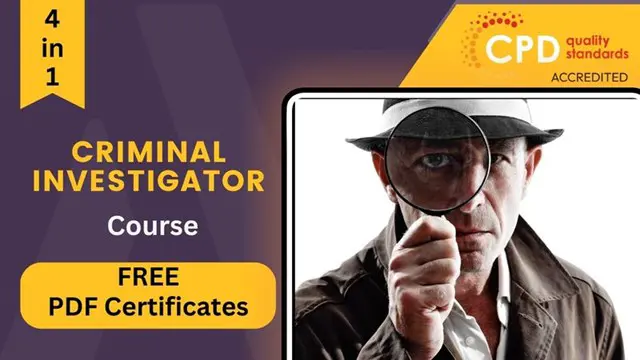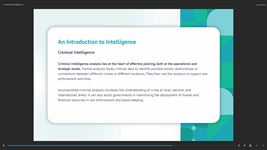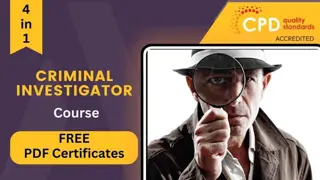
Criminal Investigator training
Blooming Spring Sale : Up to 98% Off | 4 in 1 Exclusive Bundle | PDF Certificate, Transcript, Student ID & Test Included
StudyHub
Summary
- CPDQS Digital Certificate & Transcript Included for The Title Course Only - Free
- CPD Certified Printed Hardcopy Certificate (Per Unit) - £8
- Exam(s) / assessment(s) is included in price
- Tutor is available to students
Add to basket or enquire
Overview
Who doesn't enjoy the thrill of watching movies like Sherlock Holmes and the exciting adventures characters do to solve their cases? So if you are fascinated by the world of Detectives catching Criminals, a career as a Criminal Investigator and other related sectors could be perfect for you.
Criminal investigators must think fast and make quick decisions to solve cases. Our course will help you do just that. You'll also get familiar with the roles and responsibilities of a criminal investigator and private detective. In this comprehensive course, you'll learn about crime scene investigation, DNA analysis etc.
Moreover, gain the ability to understand criminal psychology, identify violent crimes, trace and surveillance techniques, interrogation and much more throughout this course. You'll also learn about criminal laws and accident investigation to become an all-around criminal investigator. So enrol now and take the next step towards becoming a criminal investigator.
Along with this Criminal Investigator course, you will get three other premium courses totally for free.
- Course 1: Criminal Investigator
- Course 2: Criminal Intelligence and Forensic Science
- Course 3: Accident Investigation
- Course 4: Criminology: Criminal Law
Learning Outcomes:
- Learn the necessary skills and roles, and responsibilities of a criminal investigator and private detective
- Discover the dangers that come with this valiant occupation
- How to investigate crime scene as well as forensic psychology
- Know how to collect and pack physical evidence, including DNA evidence and fingerprints, and also how to detect cyber attackers
- Become well-versed in business theft and fraud, victimology, firearms examination
Certificates
CPDQS Digital Certificate & Transcript Included for The Title Course Only
Digital certificate - Included
After studying the course materials, you will be able to take the MCQ test that will assess your knowledge. After successfully passing the test you will be able to claim One Digital Certificate & Transcript for the title course completely free of cost. The cost for additional digital certificates is £4.99 each.
CPD Certified Printed Hardcopy Certificate (Per Unit)
Hard copy certificate - £8
- FREE UK Delivery
- International Delivery +£ 10.00
The price for each Printed Hardcopy Transcript is £9.99.
- FREE UK Delivery
- International Delivery +£ 10.00
Student ID Card is included in the price, excluding shipping fees.
- UK Delivery £4
- International Standard +£ 8.00
Course media
Description
Course Curriculum:
Module 1: Required Skills to Become a Criminal Investigator
- Definition of a Crime Investigator
- Roles and Responsibilities
- Necessary Skills
- Thinking Process
- Decision Making
- The Investigative Mindset
- The Code of Ethics
- The Pathway to Becoming a Criminal Investigator
- Career
Module 2: An Introduction to a Private Detective
- What is a Private Detective?
- Roles and Responsibilities of a Private Detective
- Duties of a Private Investigator
- Skills and Characteristics Required to be a Good Private Detective
- Need and Scope of Private Detective
- Dangers faced by Private Detective
- Career as a Private Detective
Module 3: Criminal Intelligence
- An Introduction to Intelligence
- The intelligence process
- National Intelligence Model: the United Kingdom
- Analysis and analytical Process
Module 4: Crime Scene Investigation
- Introduction
- Police Goals and Objectives
- Evidence Collection
- Actions of the Initial Responding Officer
- Processing Methodology
- Narrative Descriptions
- Crime Scene Photography
Module 5: Collecting and Packaging Physical Evidence
- Locating Physical Evidence
- Collecting and Packaging Physical Evidence
- Handling Evidence
- Packaging Evidence
- Biological Materials
- DNA Evidence
- Maintaining The Chain of Custody
- Obtaining Standard/Reference Samples
- Submitting Evidence To The Laboratory
- Ensuring Crime Scene Safety
Module 6: Fingerprints: Your Signature
- Getting a Grip on Fingerprints
- Developing The Science: A Trip Through Fingerprint History
- Measuring bodies: A precursor to fingerprinting
- Using Ridge Patterns
- Grouping by arches, loops, and whorls
- Developing the Henry System
- Using Chemistry to Expose Prints
- Cleaning up the Print: Digital Techniques
Module 7: DNA Analysis
- Overview
- The Function and Structure Of DNA
- DNA Identification
- Collection And Preservation of DNA Evidence
- Preparing DNA Samples For Fingerprinting
- Summary
Module 8: Criminology and Criminal Psychology
- Criminology
- Definition of Crime
- Types of Crime
- Classification of Crime
- Psychology and Criminal Psychology
- Open Source of Information
Module 9: Violent Crimes and Cyber Criminology
- Violence and Conflicts
- Crime and Social Media
- Why Cybercrime Occurs
- The Dark Web
- Detecting cyber attackers
- Threat Analysis and Prediction
Module 10: Business Theft and fraud
- Major Types of Fraud and Corruption
- Identify Theft
- Crime in the Corporate Sector
- Corruption and Fraud in Policing
- Fraud and Corruption in Times of Disaster
Module 11: Domestic Investigation and Types
- Defining Domestic Abuse
- Role of Investigators in Domestic Abuses
- Marital cases
- Divorce cases
- Child Abuse
- Elder Abuse
- Asset investigation
Module 12: Victimology
- Introduction to Victimology
- A Constructive View
- Expectations of the Victim
- Communication of Victimisation
Module 13: Dealing with Crime
- Overview
- The Investigative Function
- Supporting Activities
- Conducting Investigations
- Organization and Management
Module 14: Tracing and Surveillance Techniques
- Overview
- Smart Visual Surveillance
- Gait Recognition
- Attribute Analysis
- Surveillance for Security and Defense
Module 15: Effective Interrogation Techniques
- The Search for Truth
- Psychophysiological Basis of Forensic Assessment
- Interview vs Interrogation
- Question Formulation
- Nonverbal Behavioral Assessment
Module 16: Basic Operations of Firearms
- Introduction
- Types of Firearms
- Ammunition
- Laser Sights
- Quality Practice
- Dry Practice
- GPS of Personal Defense
Module 17: Firearms Examination
- Characteristics of Firearms
- Ammunition
- Firearms Evidence
- Gunshot Residue (GSR) Analysis
- Collecting Firearms Evidence
- Handling of Firearms
- Cartridge Cases
- Bullets
- Test Firing
- Powder Pattern Examination
Module 18: Forensic Psychology
- Introduction
- Ethical Principles
- Forensic Science
Module 19: The Criminal Justice System in England and Wales
- Overview
- What is Criminal Justice
- Criminal Justice: Functions and Form
- Criminal Justice In England and Wales
- Serious and Organised Crime Agency (SOCA)
- Aims of the Criminal Justice System
Who is this course for?
Anyone from any background will find this course helpful. Especially
- Criminal Investigators
- Private Detectives
- Police
- Forensic Psychologist
- Aspiring professionals
Requirements
This Criminal Investigator was made by professionals and it is compatible with all PC’s, Mac’s, tablets and smartphones. You will be able to access the course from anywhere at any time as long as you have a good enough internet connection.
Career path
Criminal investigators and aspiring professionals can explore their opportunities, such as
- Private Investigator
- Criminal Investigator
- Intelligence Analyst
- Police Officer
- Laboratory Technician
And much more! In the UK, these professionals' income ranges from £25,000 to £65,000 per year.
Questions and answers
Currently there are no Q&As for this course. Be the first to ask a question.
Reviews
Currently there are no reviews for this course. Be the first to leave a review.
Legal information
This course is advertised on reed.co.uk by the Course Provider, whose terms and conditions apply. Purchases are made directly from the Course Provider, and as such, content and materials are supplied by the Course Provider directly. Reed is acting as agent and not reseller in relation to this course. Reed's only responsibility is to facilitate your payment for the course. It is your responsibility to review and agree to the Course Provider's terms and conditions and satisfy yourself as to the suitability of the course you intend to purchase. Reed will not have any responsibility for the content of the course and/or associated materials.









